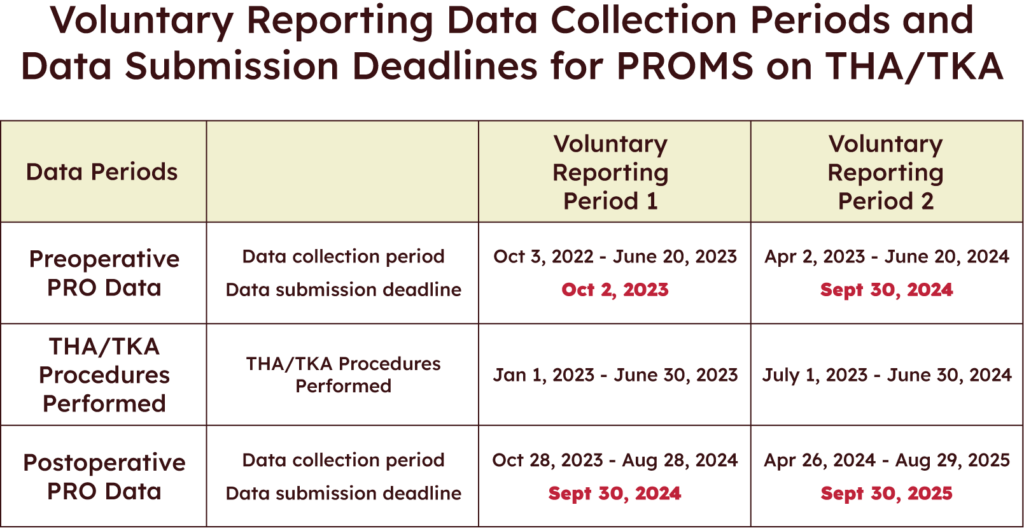Starting in 2025, orthopedic practices (and other healthcare providers who offer these services) will be required to report patient-reported outcome measures (PROMs) for total hip arthroplasty (THA) and total knee arthroplasty (TKA) surgeries. This mandate is part of a broader initiative by the Centers for Medicare & Medicaid Services (CMS) to improve patient care and outcomes through standardized data collection.
Let’s explore the specifics of this new requirement, the implications for healthcare providers across the country, as well as the numerous benefits of incorporating PROMs into your clinical practice.
What Are The Requirements for Mandatory PROMs on TKA/THA?
CMS mandates that at least 50% of patients report achieving substantial clinical benefit (SCB), with thresholds set at 22 points for HOOS, JR. (hip outcomes) and 20 points for KOOS, JR. (knee outcomes).
Patients eligible to participate in the mandatory PROMs for THA/TKA are those aged 65 and older, enrolled in Medicare fee-for-service, and undergoing primary elective THA/TKA as inpatient procedures.
However, certain patients are excluded from this requirement, including those undergoing revisions, removals, or dealing with mechanical complications, as well as those having partial, hemi, or uni-compartmental procedures. Additionally, patients with musculoskeletal malignancies, those enrolled in Medicare Advantage, and those undergoing procedures due to fractures are also excluded from participating in the mandatory PROMs.
These reports will factor into the hospital’s risk-standardized improvement rate (RSIR), reflecting the percentage of patients who show significant improvement after surgery.
Confused? Don’t worry, we’ll untangle the mess!
What Is The Objective of Mandatory PROMs on TKA/THA?
The primary goal of this new requirement is to quantify pain and functional improvements using validated PROMs, thereby enhancing patient lives and their health outcomes.
By systematically capturing patient feedback on their pain levels and functional status before and after surgery, healthcare providers can ensure that treatments lead to meaningful improvements in patient outcomes.
This focus on patient-centered metrics aims to improve the overall quality of care and patient satisfaction.
Voluntary PROM Reporting Periods
To facilitate a smooth transition to mandatory reporting, there will be two voluntary reporting periods leading up to the 2025 deadline.
These periods will allow hospitals and surgeons to get familiar with the data collection and reporting processes. The voluntary phases are designed to help institutions identify any challenges and make necessary adjustments before reporting becomes mandatory.
Voluntary Reporting Data Collection Periods and Data Submission Deadlines for PROMs on THA/TKA
What Are The Consequences for Non-Compliance with Mandatory PROMs on TKA/THA?
Failure to report PROMs at the required levels will have significant financial repercussions starting in fiscal year 2028.
Healthcare providers who do not comply will face a 25% reduction in the Annual Payment Update (APU) for all Medicare Fee-for-Service Part A claims, which includes non-orthopedic claims.
Additionally, non-compliant healthcare providers will be disqualified from participating in Medicare value-based purchasing programs, further impacting their revenue streams.
What Are The Expectations of The Implementation of Mandatory PROMs on TKA/THA?
CMS anticipates that the development and implementation of THA/TKA data collection systems will be both time-consuming and costly.
Hospitals and surgeons are expected to collaborate closely to establish comprehensive data collection systems that can accurately capture the necessary PROM data. This collaboration will likely involve significant investment in new technologies, staff training, and workflow adjustments to ensure seamless integration into existing clinical practices.
What Are The Key Deadlines for Implementing Mandatory PROMs on TKA/THA?
Hospitals must adhere to specific timelines for PROM data collection and submission for THA/TKA procedures:
- Baseline data and PROMs need to be captured starting from July 1, 2024.
- Pre-op data collection must occur from April 2, 2024, to June 30, 2025, with submission by September 30, 2025.
- Post-op data collection should be from April 27, 2025, to August 29, 2026, with submission by September 20, 2026.
CMS will publicly report the outcomes starting in 2027, which will include the percentage of patients achieving substantial clinical benefit (SCB).
What Does This Mean for Healthcare Providers?
Healthcare providers offering THA/TKA surgical procedures must prepare to integrate PROMs into their practices and ensure there are systems in place to collect, analyze, and report on this data effectively.
The official requirement encourages collaboration between surgeons and hospitals to establish comprehensive data collection methods, which might involve significant financial and time investment in new technologies and training.
Here are some aspects of mandatory PROM implementation you should consider when preparing your practice for the upcoming changes:
Implementation Costs
Developing and implementing the necessary systems for PROM data collection and analysis can be expensive. Healthcare providers will need to invest in centralized software, staff training, and possibly in hiring additional personnel to manage the mandatory PROM process.
Data Collection Systems
As instructed by the CMS, hospitals and surgical practices will need to design systems that can efficiently collect and manage large volumes of patient data and integrate with PM/EHR software to avoid exhaustive manual data entry workload.
 Workflow Integration
Workflow Integration
Integrating PROMs into the existing clinical workflow without disrupting patient care is essential: this will require careful planning and adaptation of current processes to accommodate new tasks.
Staff Training
All staff members should be trained in the process of collecting PROMs and its importance. The staff training should cover the technical aspects of using the new systems once they are in place as well as the clinical relevance of the PROMs.
Patient Engagement
Successfully engaging patients in the process of providing PROMs is crucial to achieving the required response rates. You can strategically improve patient participation through educational materials, regular reminders, and simplifying the survey process through automation and optimized user experience.
Don’t Stress: You Should Be Collecting PROs Anyway
The upcoming mandate might seem challenging to healthcare providers, but collecting patient-reported outcomes brings many advantages when it comes to patient-centered care, healthcare marketing efforts, and overall healthcare business growth and stability.
This is why we have been advocating for the implementation of PROMs long before the recent announcement. Let’s explore the benefits that make PROs a valuable asset to your practice regardless of regulatory requirements.
Improved Clinical Decision-Making
Collecting PROs helps you gain comprehensive insights into the patient experience. This information is crucial in tailoring healthcare treatments and interventions more effectively and ensuring that care is patient-centered and responsive to patients’ individual needs.
Enhanced Treatment Plans
Understanding how patients perceive their pain and functionality under the underlying health condition can help you make more informed decisions about treatment adjustments or additional interventions.
Monitoring Progress
Regularly collecting PROs allows healthcare professionals to track patient progress over time, identifying any issues early and addressing them timely. This data can inform treatments and approaches of future patients with similar conditions.
Personalized Care
PROs help in developing personalized care plans that align more closely with patient expectations and outcomes, increasing patient satisfaction, patient retention, Lifetime Patient Value, and overall health outcomes.
Assessment of Patient Satisfaction
 PROs provide a direct measure of patient satisfaction: this feedback is invaluable for identifying the areas of improvement of healthcare services and ensuring that patients feel heard, valued, and safe.
PROs provide a direct measure of patient satisfaction: this feedback is invaluable for identifying the areas of improvement of healthcare services and ensuring that patients feel heard, valued, and safe.
Detailed patient feedback can pinpoint the burning pain points and reveal the specific aspects of your care that may need improvement, such as pain management, postoperative support, or staff communication.
Collecting PROs demonstrates a commitment to understanding and improving patient experience at your healthcare practice, therefore strengthening the relationship between patients and healthcare providers (including your staff and your brand too).
Finally, using PROs to continually assess and improve the quality of care in your practice helps maintain the high standards patients demand and fosters trust.
PROs Can Boost Your Healthcare Marketing Efforts
Positive patient-reported outcomes can be a powerful tool in healthcare marketing, serving as honest patient testimonials and data-backed proof of the effectiveness and quality of care your practice provides.
Build Your Reputation
High patient satisfaction and positive outcomes, as reported through PROMs, can significantly boost the reputation of your healthcare practice. In today’s day and age, reputation is the new word-of-mouth: it attracts new patients who seek reliable and high-quality care.
Stand Out Among Competitors
PROMs can help you identify and highlight your practice’s unique strengths and the success of specific treatments, and then use that data to promote your services and distinguish your practice from the competition.
Showcasing superior outcomes in pain management or functional recovery will position your practice as a leader in your specialized line of care. This approach will attract patients who seek evidence-based treatment options (and, honestly, don’t we all?).
Leverage Patient Testimonials
Use positive patient feedback captured through PROMs as authentic testimonials on your marketing channels and in your case studies.
These real-world success stories act as tangible evidence of the benefits and effectiveness of the care you provide, encourage potential patients to take the next step in their healthcare journey and build trust and credibility in the community.
However, to act in good faith and maintain HIPAA compliance, make sure you get your patients’ permission to use their feedback publicly.
Benchmarking and Quality Improvement
The data collected through PROs allows you to benchmark your performance against national standards and identify areas for quality improvement.
Conducting comparative analysis with national or regional benchmarks helps you understand how your practice performs relative to competition and lets you pinpoint where outcomes are below benchmarks, so you can apply targeted quality improvement strategies.
Regularly collecting and analyzing PROs ensures compliance with industry standards and helps providers prepare for audits and reviews.
Streamline Collection and Analysis of PROs with Healthcare Marketing Automation
The upcoming requirement for mandatory reporting of PROMs on THA and TKA surgeries marks a significant shift towards data-driven patient care. While the implementation of this mandate may seem overwhelming, the benefits of collecting and using PROs in promoting and growing a patient-centered healthcare business outweigh the challenges.
Leveraging contemporary healthcare-specific technology to automate and integrate PROMs into routine practice can improve clinical decision-making, enhance patient satisfaction, boost your marketing efforts, and position your healthcare practice as a leader in quality care.
SocialClimb’s comprehensive healthcare marketing platform offers a wide array of features that help you centralize and streamline your marketing efforts. Our platform is strongly dedicated to patient surveys and it provides electronic, user-friendly solutions for collecting PROs, CAHPS, and NPS surveys through automated workflows.
Customizable reporting features allow you to analyze data comprehensively without manual data processing and conduct data benchmarking on a national level, while our HIPAA-compliant PM/EHR integrations provide an easy way to keep everything safely connected without additional costs or workload.
Automated systems streamline the process of survey distribution, data collection, and analysis, reducing the burden on healthcare providers, ensuring compliance with reporting requirements, and elevating the standard of care provided to patients.












